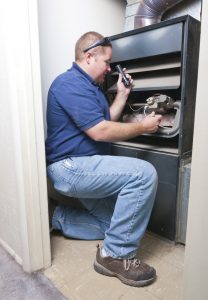 As hard as it may be to believe, we’re moving into the tail end of winter, and the weather will begin to warm up in just a few weeks. That doesn’t mean that your heater will be getting a break, however.
As hard as it may be to believe, we’re moving into the tail end of winter, and the weather will begin to warm up in just a few weeks. That doesn’t mean that your heater will be getting a break, however.
Indeed, late the season is the time when your system is most vulnerable to repair issues: having been working on a daily basis for months, and subjected to increasing strain as wear and tear take their toll. You should keep an especially close eye on your heating system this time of year and call in a repair service if you detect any problems.
Common Problems
We’ve provided a short list of potential issues which are common late in the heating season. While you should never attempt to formally diagnose a heating problem, you can still check for anything out of the ordinary. Late in the season, these issues may creep up on you. Most of them rarely arise out of nowhere and they may have been growing in urgency throughout the winter.
Common problems can include, but are not limited to, the following:
- Low Heat Levels, which force your system to work harder than normal. If the air coming out of your vents is cooler than you expect, it can mean anything from a clogged burner to a breach in the ducts.
- Low Air Flow, similarly, low air flow makes your system work harder, and can cause additional difficulties because the hot air often stays trapped in the system. It can be caused by clogged filters, dents in the ducts or problems with the fan blower.
- Refusal to Turn On. In some cases, the heater may refuse to turn on at all. This is often caused by safety features kicking in: preventing damage to the system or potential hazards such as gas leaks. In these cases, check your breaker box and thermostat before calling in a repair service, in case it’s something that can be easily resolved.
- Strange Noises. Strange noises can mean just about anything, from whistles and hums to clatters and bangs. The only common factor is that you do not recognize them as part of your system’s normal operating sounds, and — in almost all cases — the strange noise will start and stop in conjunction with the starting and the stopping of your system.
- Short Cycling. Short cycling is the habit of turning on and running for a brief period, then turning off, only to turn on again a few minutes later. It can be caused by overheating components, electrical problems or even larger issues. It’s a huge problem because heating systems use much more power to turn on and turn off than they do simply running.
- Higher Bills. Sometimes, the issue doesn’t involve anything specific, but causes a component to malfunction or consumed more energy. In those cases, you may see a spike in your heating bills even though you haven’t used the system more than normal.
For heating repair services in Fort Wayne, IN, call the pros at Collier’s Comfort today!
